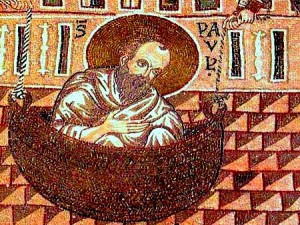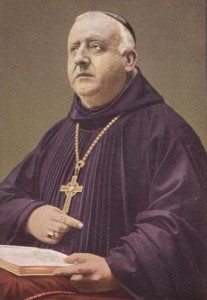Key concept #1: Liturgy is theology. In fact, it is primary theology.
The “Benedict Option” as exercised by actual Benedictines, is not a rejection of the world, but of regnant worldviews that distort and obscure the gospel. Which is to say such worldviews obscure reality. This is because Christ the Truth came from the Father to free us from sin and error. Worldviews are not so easy to change. They are generally the whole background of everything we think and do. To subject our worldview to a systematic examination can be profoundly disorienting. We should recall that it took Saint Paul many years to sort out the full implications of his conversion (he doesn’t specify, but note the passage of seventeen years in Galatians 1: 18–2: 1, some of which was certainly spent rethinking everything). Saint Antony the Great retreated to the desert around the age of 20 and emerged as a public figure again at 50. Things take time.

Paul’s early career was a series of reversals. Here is depicted his stealth escape from Damascus, the city where he had gone to persecute Christians.
But it helps when others can point out something of the goal, something of the discrepancy between what we had been taking for granted and what our new worldview-in-Christ should look like.
In the early Church, theology was roughly the equivalent of contemplative prayer, a first-hand, personal knowledge of God. This is to be distinguished from knowledge about God or from mere knowledge that God exists, hearsay accounts of God. But contemplative prayer took for granted the Church and the Church’s regular engagement in liturgy. Liturgy is our participation in the exercise of Christ’s high priesthood, the lifting up of our hearts and minds to God, our mystical encounter with God.
Toward the end of the Middle Ages, the word ‘theology’ began to undergo a certain transformation, becoming the more familiar academic concept. This wasn’t entirely bad; in fact, there were many good things that came about from the more systematic application of philosophical methods to the common fund of the knowledge of God.
But this new idea of theology is at a second remove from the encounter with God. At least it can be performed that way. This began to be felt as a problem in the early nineteenth century, as the effects of the Enlightenment began to be felt even within the Church. The roots of the liturgical movement are found in the efforts of Dom Prosper Gueranger and the Wolter brothers at Beuron. In both cases, an effort was made to experience a fuller liturgical celebration. The movement gained greatly in the twentieth century and bore real fruit in the Second Vatican Council (even if it’s taken us time to sort of the wheat from the tares in the intervening years). The liturgical reforms of Vatican II were meant to help re-open the font of theology to everyone, to make available the insights of Benedictines like Odo Casel, Lambert Beaudoin, and Blessed Columba Marmion, for the whole Church, especially those outside the cloister.
Joseph Bottum relates a telling anecdote in An Anxious Age. He is discussing contemporary Catholicism with students in California. One tells him, “I just go to church for confession, to pray, and to take Communion.” The gist of the story, in Bottum’s version, is that young people tune out the homilies and don’t expect much from priests, other than that they show up and dispense the sacraments. What strikes me in this quote is the lack of any sense that Communion, confession, and prayer are all liturgical acts, couched in a whole world, strewn with Biblical vocabulary, thick symbolic gesture, and so on. Rather than living an entirely new life in Christ, the sense is that we go on living in the old world, the one that’s passing away, and from time to time we get our sacramental immunization shot a church, then return to that old world, hopefully not to lose too much fervor along the way. This is better than skipping church! But is it adequate to the New Evangelization that we are being challenged to undertake?
We all know (thanks to Vatican II and Saint John Paul II) that the Eucharist is the source and summit or our baptismal lives. But how do we make sense of it? The Church has given us a whole liturgical discipline to assist us in unpacking the life-altering content of Christ’s gift.
Acclimating ourselves to this “Liturgical Asceticism” (I use here Notre Dame prof David Fagerberg’s term) takes time. And so often when I mention this idea of liturgy as primary theology, the concern is that we need something more immediate, effective, engaged! Something slimmed down for a jet-set generation.
But this was part of my point in mentioning Paul and Antony. Learning to see with spiritual eyes does take time. Yes, there are prodigies like St. Thérèse of Lisieux, who benefit from saintly parents and a strong Catholic culture in general. But for most of us, in most ages of the Church’s history (we conveniently forget that the first thousand years were not always so resoundingly successful in the West!), divinization is a long, and sometimes arduous process. And why not? Isn’t the God of all peace worth the finite struggles of this temporal life? More to come.
